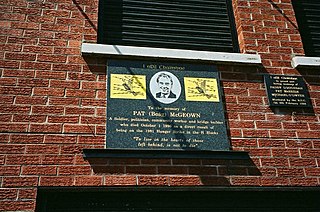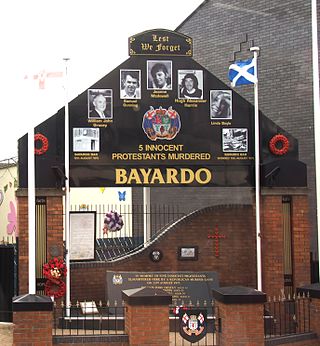 | |
| Author | Ed Moloney |
|---|---|
| Language | English |
| Publisher | Penguin Books |
Publication date | 30 September 2002 |
| ISBN | 978-0393051940 |
A Secret History of the IRA is a book by journalist Ed Moloney, first published by Penguin Books in 2002.
 | |
| Author | Ed Moloney |
|---|---|
| Language | English |
| Publisher | Penguin Books |
Publication date | 30 September 2002 |
| ISBN | 978-0393051940 |
A Secret History of the IRA is a book by journalist Ed Moloney, first published by Penguin Books in 2002.
| | This section needs expansion. You can help by adding to it. (May 2013) |
Reviewers responded favorably. In The Blanket, an online journal, reviewer Liam O Ruairc described the book as potentially "the standard if not the definitive work on the history of the Provisional IRA". [1] Eamonn McCann, in The Nation, commented that it was "the best book yet" written on the Provisional IRA as it traced the rise of the Provos from the burning out of Catholic neighborhoods in Belfast in August 1969 to "the enclosure of the movement's leadership within conventional bourgeois politics through the Good Friday Agreement of 1998" (Belfast Agreement). [2]
A central theme in the book is the role that Sinn Féin President Gerry Adams has played in the Irish republican movement. In his review, O Ruairc noted that the book could have been "better titled A Secret History of Gerry Adams". [1] In The Sunday Business Post Online, reviewer Tom McGurk, in reference to the strategy articulated by Danny Morrison at the 1981 Sinn Féin Ard-Fheis, wrote that the book "grippingly" detailed Adams's struggle to move from the Armalite to the ballot box "without a split and without bodies in ditches". [3]
The book was met with controversy because of some of the revelations it contains. Those revelations reveal both a strength and weakness, in that some of Moloney's sources were willing to speak in great detail but with the caveat that they remain confidential. [4]

The Provisional Irish Republican Army, officially known as the Irish Republican Army and informally known as the Provos, was an Irish republican paramilitary force that sought to end British rule in Northern Ireland, facilitate Irish reunification and bring about an independent republic encompassing all of Ireland. It was the most active republican paramilitary group during the Troubles. It argued that the all-island Irish Republic continued to exist, and it saw itself as that state's army, the sole legitimate successor to the original IRA from the Irish War of Independence. It was designated a terrorist organisation in the United Kingdom and an unlawful organisation in the Republic of Ireland, both of whose authority it rejected.

Gerard Adams is an Irish republican politician who was the president of Sinn Féin between 13 November 1983 and 10 February 2018, and served as a Teachta Dála (TD) for Louth from 2011 to 2020. From 1983 to 1992 and from 1997 to 2011, he followed the policy of abstentionism as a Member of Parliament (MP) of the British Parliament for the Belfast West constituency.

The 1981 Irish hunger strike was the culmination of a five-year protest during the Troubles by Irish republican prisoners in Northern Ireland. The protest began as the blanket protest in 1976, when the British government withdrew Special Category Status for convicted paramilitary prisoners. In 1978, the dispute escalated into the dirty protest, where prisoners refused to leave their cells to wash and covered the walls of their cells with excrement. In 1980, seven prisoners participated in the first hunger strike, which ended after 53 days.
Armalite and ballot box was a political catchphrase used to define the strategy pursued by Irish republicans from 1981 up until the 1994 IRA ceasefire in which Sinn Féin ceased its policies of election boycott and abstentionism and instead contested elections in Northern Ireland and the Republic of Ireland, while the Provisional Irish Republican Army (IRA) pursued an armed campaign to end Northern Ireland's status as part of the United Kingdom.

Joe Cahill was a prominent figure in the Irish republican movement in Northern Ireland and former chief of staff of the Provisional Irish Republican Army (IRA). He joined a junior-republican movement, Na Fianna Eireann, in 1937 and the following year, joined the Irish Republican Army. In 1969, Cahill was a key figure in the founding of the Provisional Irish Republican Army. During his time in the Provisional IRA, Cahill helped import weapons and raise financial support. He served as the chief of staff in 1972, but was arrested the following year when a ship importing weapons was intercepted.
The IRA Army Council was the decision-making body of the Provisional Irish Republican Army, a paramilitary group dedicated to bringing about independence to the whole island of Ireland and the end of the Union between Northern Ireland and Great Britain. The Council had seven members, said by the British and Irish governments to have included Gerry Adams, the president of Sinn Féin. The Independent Monitoring Commission declared in 2008 that the council was "no longer operational or functional," but that it had not dissolved.

An Phoblacht is a formerly weekly, and later monthly newspaper published by Sinn Féin in Ireland. From early 2018 onwards, An Phoblacht has moved to a quarterly magazine format while remaining an online news platform. Editorially the paper takes a left-wing, Irish republican position and was supportive of the Northern Ireland peace process. Along with covering Irish political and trade union issues the newspaper frequently featured interviews with celebrities, musicians, artists, intellectuals and international activists.

Daniel Gerard Morrison is an Irish former Provisional Irish Republican Army (IRA) volunteer, author and activist who played a crucial role in public events during the Troubles in Northern Ireland. An Irish republican, Morrison is also a former Sinn Féin publicity director and editor of Republican News and An Phoblacht. He is the secretary of the Bobby Sands Trust and current chairman of Féile an Phobail, the largest community arts festival in Ireland.

Free Derry was a self-declared autonomous Irish nationalist area of Derry, Northern Ireland that existed between 1969 and 1972 during the Troubles. It emerged during the Northern Ireland civil rights movement, which sought to end discrimination against the Irish Catholic/nationalist minority by the Protestant/unionist government. The civil rights movement highlighted the sectarianism and police brutality of the overwhelmingly Protestant police force, the Royal Ulster Constabulary (RUC).
Several people are reported to have served as Chief of Staff of the Irish Republican Army in the organisations bearing that name. Due to the clandestine nature of these organisations, this list is not definitive.
Edmund "Ed" Moloney is an Irish journalist and author best known for his coverage of the Troubles in Northern Ireland, and the activities of the Provisional IRA, in particular.
Billy McKee was an Irish republican and a founding member and leader of the Provisional Irish Republican Army.

Brendan Hughes, also known as "The Dark", and "Darkie" was a leading Irish republican and former Officer Commanding (OC) of the Belfast Brigade of the Provisional Irish Republican Army (IRA). He was the leader of the 1980 Irish hunger strike.
Ivor Malachy Bell is an Irish republican, and a former volunteer in the Belfast Brigade of the Provisional Irish Republican Army (IRA) who later became Chief of Staff on the Army Council.

Brian Keenan was a member of the Army Council of the Provisional Irish Republican Army (IRA) who received an 18-year prison sentence in 1980 for conspiring to cause explosions, and played a key role in the Northern Ireland peace process.

Pat "Beag" McGeown was a volunteer in the Provisional Irish Republican Army (IRA) who took part in the 1981 Irish hunger strike.

Proinsias Mac Airt was an Irish republican activist and long-serving member of the Irish Republican Army.

The Bayardo Bar attack took place on 13 August 1975 in Belfast, Northern Ireland. A unit of the Provisional Irish Republican Army (IRA), led by Brendan McFarlane, launched a bombing and shooting attack on a pub on Aberdeen Street, in the loyalist Shankill area. IRA members stated the pub was targeted because it was frequented by members of the Ulster Volunteer Force (UVF). Four Protestant civilians and one UVF member were killed, while more than fifty were injured.